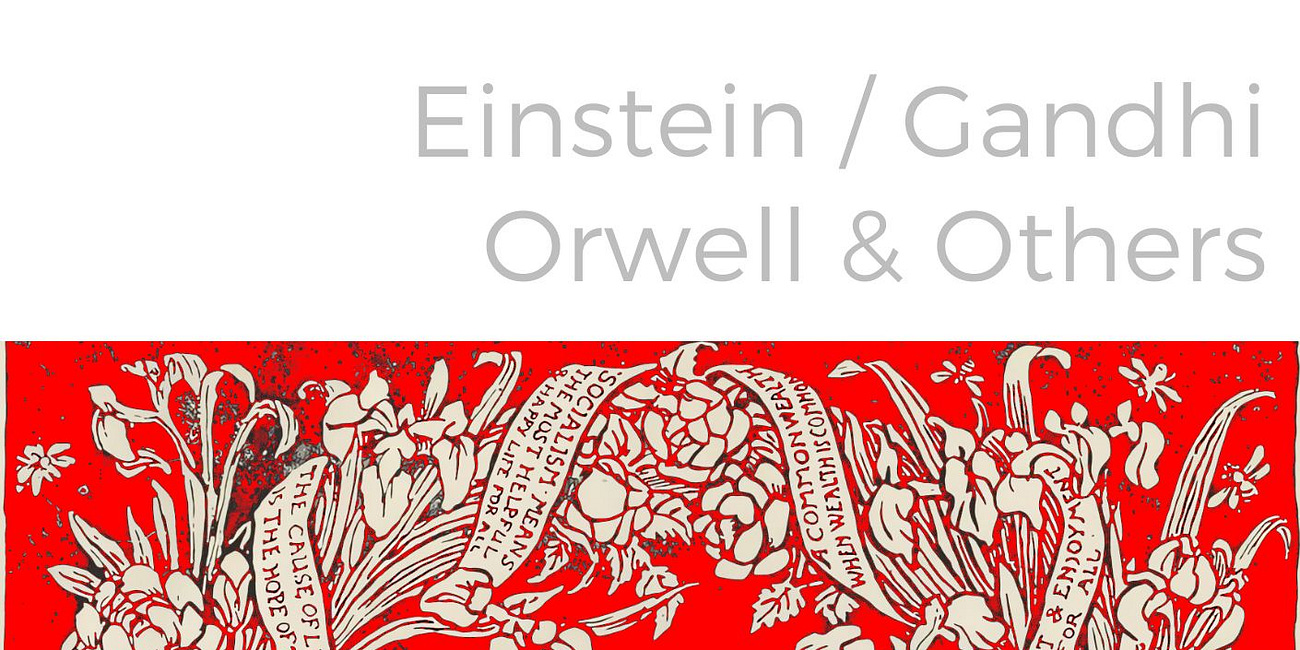Those Damned Socialists
From Einstein to Gandhi, H.G. Wells to Orwell, Luther-King to Mandela - Famous Socialists Defend Their Views
I have compiled and edited essays in a new book:
Those Damned Socialists!
Albert Einstein, George Orwell, Oscar Wilde, Helen Keller, Martin Luther King, Nelson Mandela, Oscar Wilde, and others write about their Socialist views.
About a decade ago, when beginning the journey that led me to my views today, I began collecting and later sharing essays by notable scientists, authors and revolutionaries about their political beliefs.
It initially came as a surprise to me how many of those I admired for their influences upon the world, such as Albert Einstein, Helen Keller and Martin Luther King, turned out to be Socialists.
I’d share these with friends and acquaintances who took an interest in the issues the essays covered, but a year or so ago someone suggested I should put the contents into a book.
Since then I’ve been adding historical and biographical context to the original essays as well as adding quotes from other notable Socialists, which I hope will be interesting to anyone who wonders about what great minds have had to say about how the world could be better.
The book is available now directly at Lulu. I will be serialising most of the contents over the coming weeks, but if you’d like to read the book in print or as an ebook and would like to consider supporting me in this way I’d really appreciate it. A free ebook version has been sent to paid subscribers.
The Socialist Ideal
This book is a collection of writings from the scientists, authors, and revolutionaries who considered Socialism to be a path to greater freedom and progress. They took on the label of Socialist when it may have cost them approval, popularity, and financial rewards. Despite this they believed in the simple idea that democracy shouldn’t be only the prerogative of politicians in far off government buildings, but should start in the workplace, schools and neighbourhoods and spread outward and upward from there. This volume shares their hopes and compiles some of the powerful and timely essays on why they became and believed in Socialism, that are just as relevant today as when they were written.
In the following pages you will read essays and quotes from great scientists (such as Albert Einstein and Bertrand Russell), authors who changed the way we see the future (H.G. Wells, George Orwell, and William Morris), or who gave us invaluable insights into the human condition (George Bernard Shaw, Oscar Wilde, Jack London, Kurt Vonnegut, and Christopher Hitchens), significant reformers for human rights (Helen Keller, Sylvia Pankhurst, W.E.B. Dubois, and Martin Luther King), as well as those who made a major impact on the world, and who had admiration for Socialism’s ideals (Mahatma Gandhi, Fred Hampton, Nelson Mandela, and Malala Yousafzai).
Many of them were Nobel Prize winners in their fields, and were pioneers in physics, mathematics, literature, and the arts. They gave the world a better understanding of the universe and of their fellow humans, some helping to obtain greater rights and freedoms than existed before, motivated by the principles of Socialism.
Although most of the issues contained in this book still apply today, some authors focus on contemporary problems and practical approaches to solving them, while others explain the reasons for their ideals. Some speak of their personal observations of the world as it was (and often still is), while a few call for a revolution in their lifetimes, others hopes for what a future generation might achieve. Some stressed the individual benefits of Socialism, and others the collective advantages.
They addressed different audiences and appealed to different motivations. However, all of them had the same criticisms of the coercion, exploitation and drudgery of the existing capitalist system, of the social and emotional problems that arose from this, and the destructive nature of industrialisation for profit. Ultimately, all of them shared the same ideals and the same goal of a world without poverty, hunger, homelessness, inequality, prejudice, and war.
Apart from the technological advances that are part of our lives, we still face many of the same challenges, issues and problems that people faced a hundred years ago. We live in a new Gilded Age with many of the same failings as the past one.1
Socialism’s solutions are still relevant today, including environmental protection, social justice, union involvement, supporting cooperatives, engagement in the political process (especially on the local level), sometimes bypassing the state entirely with dual power through efforts such as local community mutual aid.2
We still benefit from the literature and scientific advances that came from these prominent Socialists and many less well known ones, as well as those still coming from a new generation of Socialist authors, scientists, reformers.
However, it is only through our generation and future ones acting on these principles that will make the achievement of these ideals an inevitability, rather than just a possibility. We must continually look for opportunities to tilt the narrative and power back toward the people and the solutions of Socialism. Perhaps then our words and actions may appear in a future companion volume to this book.
The book’s conclusion has been previously posted here:
Inequality has risen again to the same levels just prior to the French Revolution (1789) and during the Gilded Age (circa 1870–1900).
Mutual Aid, Peter Kropotkin, 1902.







Last year Monthly Review reprinted Einstein’s essay “Why Socialism?” in honor of its 75th anniversary, as it was originally featured in their inaugural issue in 1949. It’s a coveted addition to my magazine rack. This was a great article. Thank you for sharing.
Just purchased a copy!